Открытое мероприятие по иностранным языкам
«We are in charge of our planet»
Цель:
сформировать целостное представление о проблемах экологии, возможных путях их решения.
Задачи:
учебные: формирование навыков и умений всех видов речевой деятельности: умение работать с новой лексикой, аудировать и читать тематические тексты с извлечением нужной информации, обсуждать проблемы по данной теме в монологических высказываниях, письмо при выполнении квиза;
развивающие: развивать способности к логическому изложению содержания высказывания, к формулированию выводов из прочитанного и услышанного, развивать способности к коммуникабельности как явному или неявному выражению своего отношения к окружающей среде и экологии, способности к самостоятельному труду(создание презентаций) , развивать у детей познавательную активность;
воспитательные: воспитание потребности в практическом использовании языка, продолжить ориентировать учащихся на разумную, экологически обоснованную деятельность, способствующую рациональному использованию и охране окружающей природной среды.
Оборудование:
компьютер, проектор, интерактивная доска, запись песни: «We are the world» Майкл Джексон, квиз «How green you are?», компьютерные презентации уч-ся по темам: «Air Pollution», «Water Pollution», «Greenpeace», « Eco -situation in the world and in our region», «Healthy food», маркеры, стикеры, листы бумаги для работы.
I этап:
Создается оргкомитет, в который входят преподаватели иностранных языков, студенты II курса. Оргкомитет разрабатывает примерный план подготовки конференции и определяет темы для обсуждения и докладов. На этом этапе устанавливаются сроки, назначаются ответственные за определенный вид работы, составляется план-сетка для удобства дальнейшей работы.
II этап.
Оформление зала.
Плакаты:
Earth is our home
Love our nature
“One couldn’t pluck a flower without troubling a star.”
Зал украшается зелеными шарами, плакатами и эмблемой мероприятия.
III этап.
Ход мероприятия:
Входят ведущие конференции
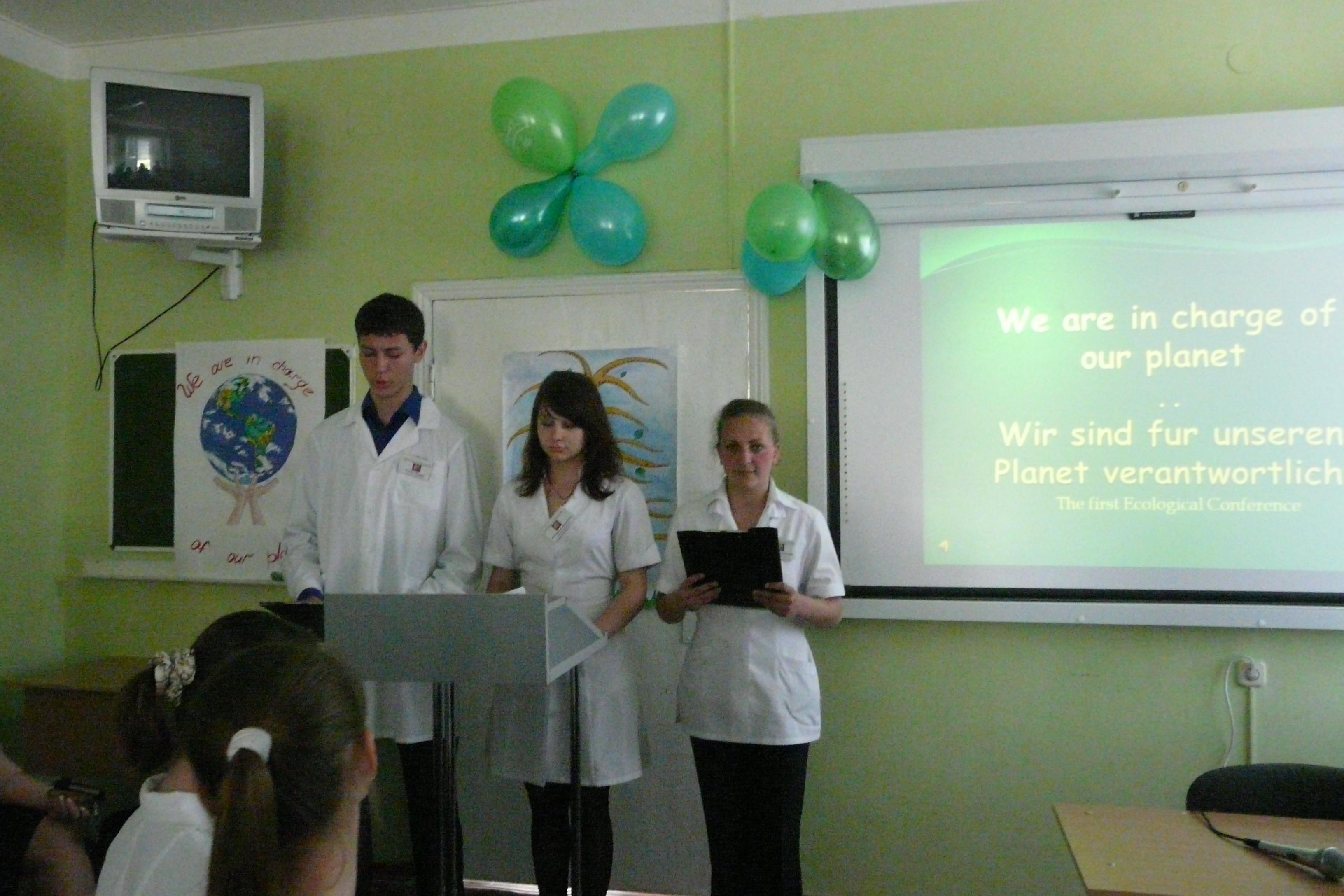
S. 1: Ladies and gentlemen! We’d like to declare the conference open.
S.2: Дамы и господа! Разрешите объявить конференцию открытой.
S.1: We are happy to welcome the conference participants
S.2: Мы счастливы приветствовать участников конференции.
S.1 : We want to thank everybody who have helped to organize the Conference. S.2: Мы хотим поблагодарить всех, кто помог организовать конференцию.
S.1: We hope the conference will be highly succesful and the participants will propose some satisfactory solution to the problem.
S.2: Надеемся, конференция будет плодотворной, а участники предложат решение данной проблемы.
S.1: The aim of our meeting is to evoke the interest of the society in this matter. S.2: Цель нашего собрания – пробудить интерес общества к данной проблеме.
S.1: What problems are to be discussed at the Conference?
S.2: Какие проблемы предлагает обсудить конференция?
S.1: So I am going to read the agenda.
S.2: Сейчас я оглашу повестку дня.
Agenda:
Multimedia presentations:
Ecological situation in the world and our region. The author of the story is Tsigankova Angilina Student of 21st group
Water pollution. The author of the story is Zemlyanskaya Tat’yana Student of 21st group, too.
Global warming. This information will give us Shishkalov Artur the 22nd group
Our students studying German will show us some problems with water life.
Healthy Food. The work is made by Menshikova Svetlana student of 21st group
Greenpeace. The author of the story is Knyazeva Uliya Student of 21st group
Discussing of the topics and asking the questions for participates.
S. 1: We’ll start with the first agenda item.
S. 2: Приступаем к 1му пункту повестки дня.
S. 1: As for the timetable we propose to allow 5 – 7 minutes for each poster, 5 minutes for questions.
S. 2: Что касается регламента, мы предлагаем дать 5 – 7 минут на представление доклада и 5 минут на вопросы.
S. 1: How can we keep the Earth clean? How can we protect the environment? To answer this question we must first of all learn the meaning of the word “ecology”.
S. 2:Как нам сохранить планету и защитить окружающую среду? Прежде всего мы должны знать значение слова «экология»
S. 1: Ecology is a science which studies relationship between all forms of life on our planet with its environment. This word came from the Greek “oikos” which means “home”.
S. 2:Экология это наука изучающая взаимодействие всех форм жизни и окружающей среды. В переводе с греческого «экос» это дом.
S. 1: This idea of home includes the whole planet of ours; it’s population, the Nature, animals, birds, fish, insects, all other living beings and even the atmosphere around our planet.
S. 2: Дом это наша планета, природа, животные, птицы, рыба, насекомые, все живое и даже атмосфера, окружающая нас.
S. 1: Tsigankova Angilina Student of 21st group will tell us about eco -situation in the world and in our region.
S. 2: Cтудентка группы С 21 расскажет нам о экологических проблемах в мире и в нашем районе.
( презентация студентки)
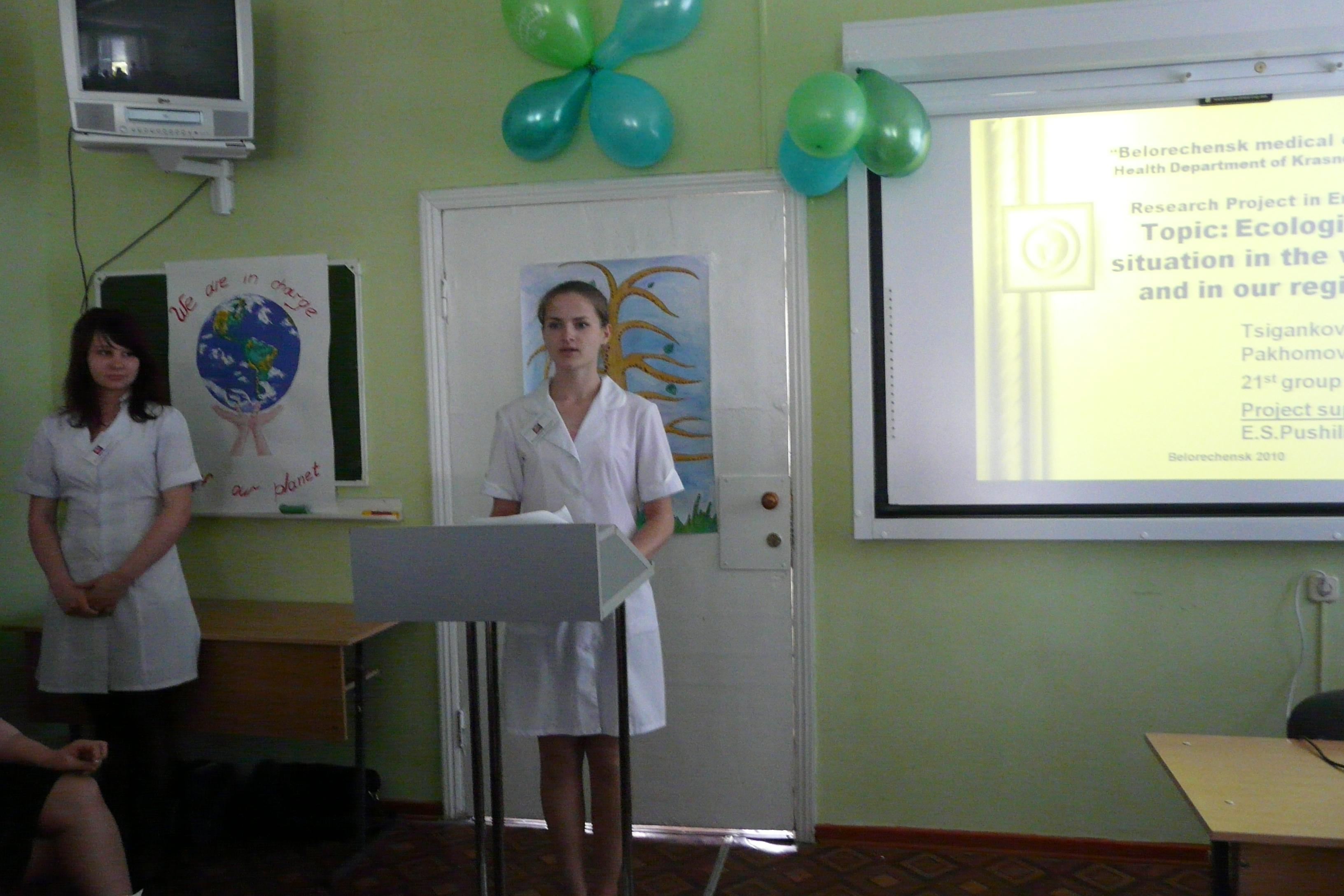
S. 1: We suppose our guests have many questions for Angelina. You are welcome, please.
S.2 : Мы полагаем у вас есть вопросы к Ангелине. Пожалуйста, задавайте.
Questions:
S. 1: Indeed, many territories, water basins, lakes, rivers, seas, oceans – and the atmosphere are polluted with all kinds of technological, agricultural, chemical, nuclear and other wastes.
S. 2: На самом деле, огромные территории, водные бассейны, озера, реки, моря, океаны и атмосфера загрязняются техническими, сельскохозяйственными, химическими, ядерными и другими отходами.
S. 1: Next our student Zemlyanskaya Tat’yana will tell us about water pollution.
S. 2: Землянская Татьяна расскажет нам о загрязнении воды.
( презентация студентки)
S. 1: Much ought to be done to keep the planet suitable for living. People will have to take measures to protect the ozone layer. You know in the atmosphere there is the O.L. It protects the Earth from the dangerous ultraviolet rays of the sun. But the ozone layer is destroyed by a stuff that aerosol sprays and refrigerators contain. And the dangerous rays get through the atmosphere, causing skin cancer and other diseases. Among 20% (twenty percents) of the ozone layer were destroyed in 1996. Can people solve the problem?
S. 1: We can only imagine how dirty the water of the ocean is; the water is not blue, but brown with rubbish, floating in it. Besides, millions of tons of oil are released into the sea every year. And many seabirds and animals die because of it. For example, many seabird and animals died in 1999, because of mln tones of oil released into the North Sea. It’s dangerous to nature and it’s dangerous to human being too.
Our students studying German will show us some problems with water life.
S. 2: Наши студенты изучающие немецкий язык тоже приняли участие в подготовке проектов
( презентации студентов)
S. 1: We are what we eat. Let’s pay some attention to our nutrition and lifestyle/
S. 2: Мы то, что мы едим. Давайте обратим свое внимание на наше питание и образ жизни.
S. 1: Healthy Food. The work is made by Menshikova Svetlana student of 21st group
S. 2: Здоровое питание. Работу выполнила студентка группы С-21 Меньшикова Светлана
(презентация студентки)
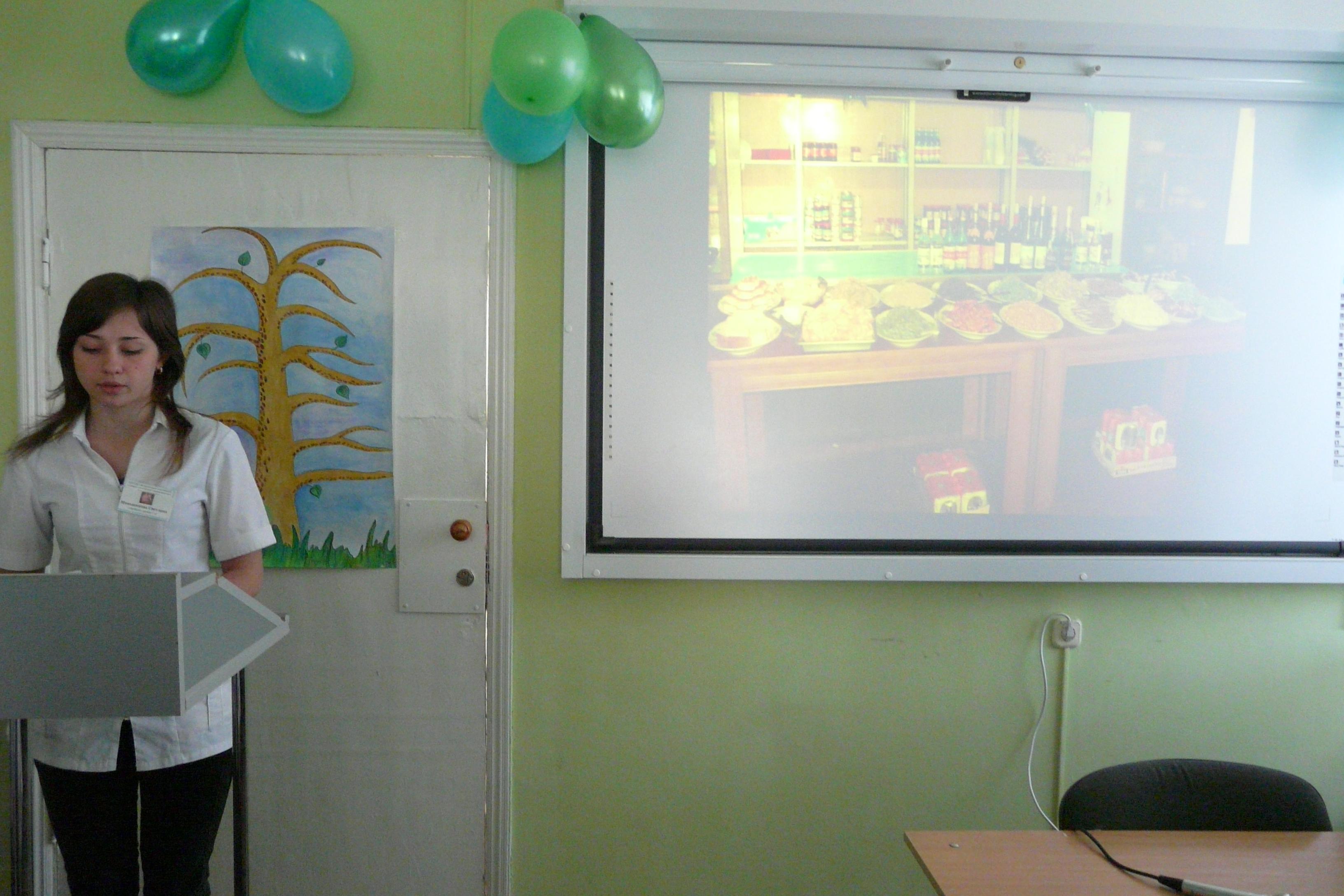
S. 1.: In recent years people have become more sensitive to the nature. Still more public organizations and unofficial environmentalist movements have been established every year. In 1987 a “Green Peace” public commission has been set up. Its main goal is to combine the people’s efforts for peace and environmental protection.
S. 2: последнее время люди стали более внимательными к окружающей среде. Стали создаваться общественные организации по защите нашей природы. В 1987 году была создана организация “Greenpeace”, главной задачей которой было объединить усилия людей в защите окружающей среды.
S. 1.: Greenpeace. The author of the story is Knyazeva Uliya Student of 21st group
S. 2.: Князева Юлия студентка группы С 21 расскажет нам о данной организации.
( презентация студентки).
S. 1.: We are happy to give you a quiz “How green are you” to see how green you are and how well informed you are about the environment.
S. 2.: Мы рады предложить вам анкету чтобы узнать насколько хорошо вы относитесь к нашей планете и как вы защищаете окружающий мир.
S. 1.: Try it now and again in six month's time, when you have taken some action.
Score one point for every "yes" answer.
S. 2.: Выполните её сейчас, а затем через 6 месяцев, когда вы что-либо уже сделаете в пользу природе. Поставьте 1 балл за каждый ответ «да».
QUIZ:
1. Do you read the list of ingredients on the food you buy?
2. Do you take a shower instead of bath?
3. Have you planted at least one tree?
4. Do you feed birds or squirrels in winter?
5. Do you insulate your house in winter to save heat?
6. Do you switch off lights if nobody needs them on?
7. Does your school/college/home use recycled paper?
8. If you have ever organised campaigns on environmental issues, score 5.
9. For short journeys, do you regularly walk, if you can?
10. For long journeys, do you regularly use a bike or public transport?
11. If your family has a car, does it run on unleaded petrol?
12. If your family doesn't have a car, score 2.
13. Do you buy ozone-friendly aerosols?
14. If you don't buy aerosols at all, score 5.
15. Do you buy cruelly-free products? (those not tested on animals)
16. If you have ever written to a manufacturer to complain about their products, score 5.
17. Do you belong to any environmental organisation?
18. Can you name one endangered species?
19 Do you take bottles to the bottle bank?
20. Do you collect aluminium cans for recycling?
21. Do you collect paper for recycling?
22. If you are a non-smoker, score 3.
23. Coming back from the forest or from the beach, do you always take your litter with
you?
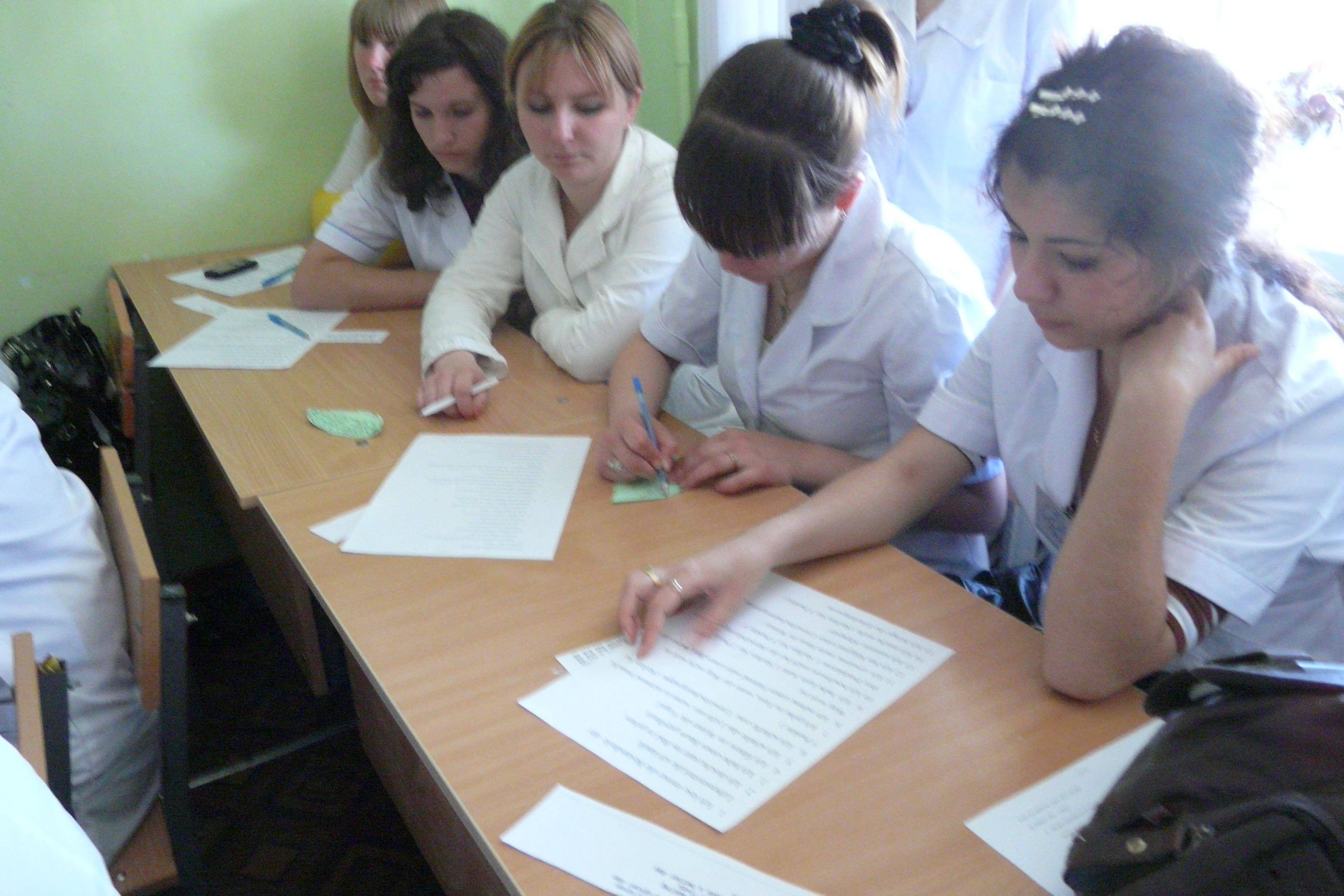
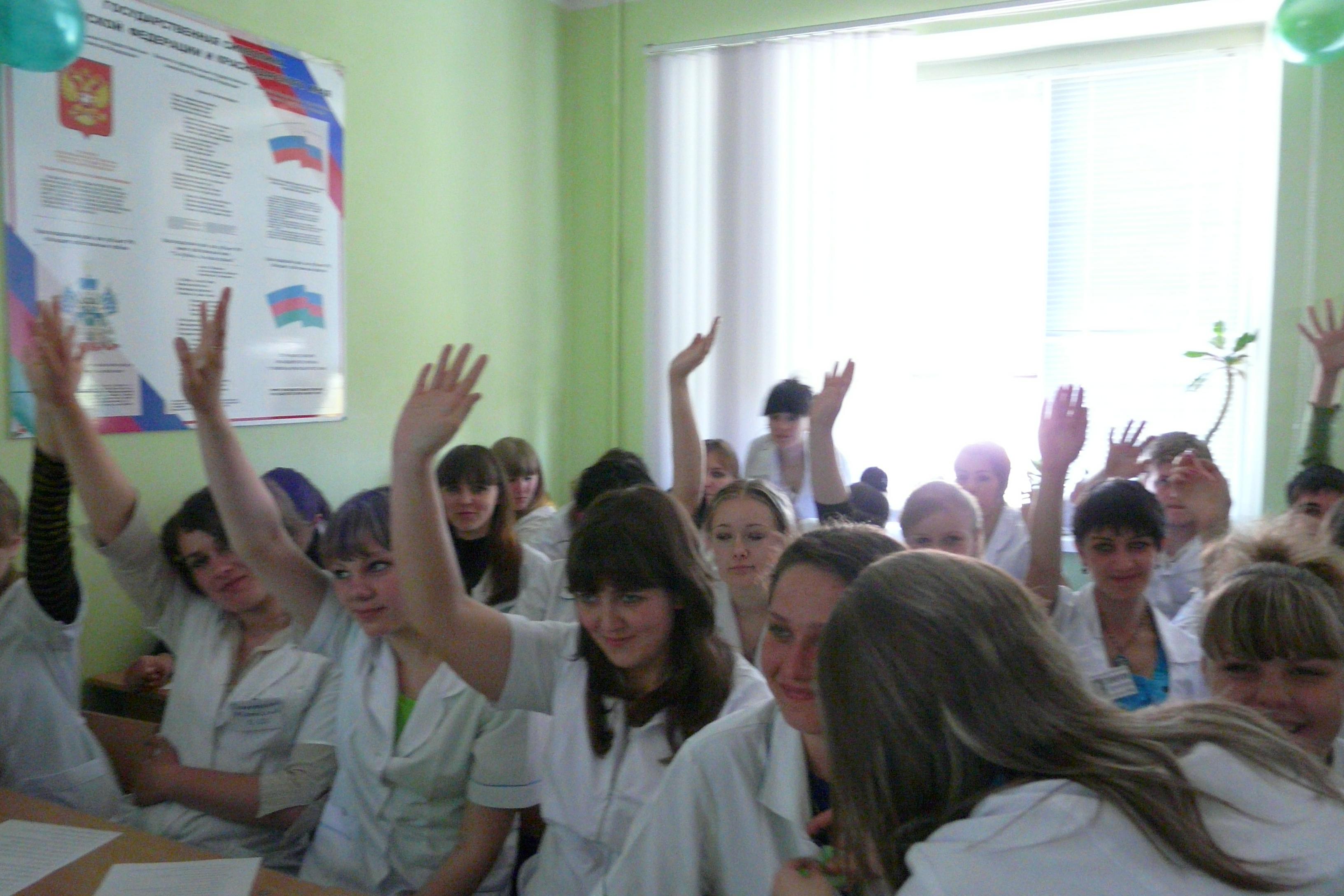
S. 1.: HOW DO YOU SCORE?
S. 2.: Сколько баллов вы набрали?
S. 1.: You are Very pale green – scores under 5
Light green – scores 6-16
Mid-green – scores 17-27
Dark green – scores 28-38
S. 2.: Вы бледно-зеленые если ваш счет меньше 5 баллов.
M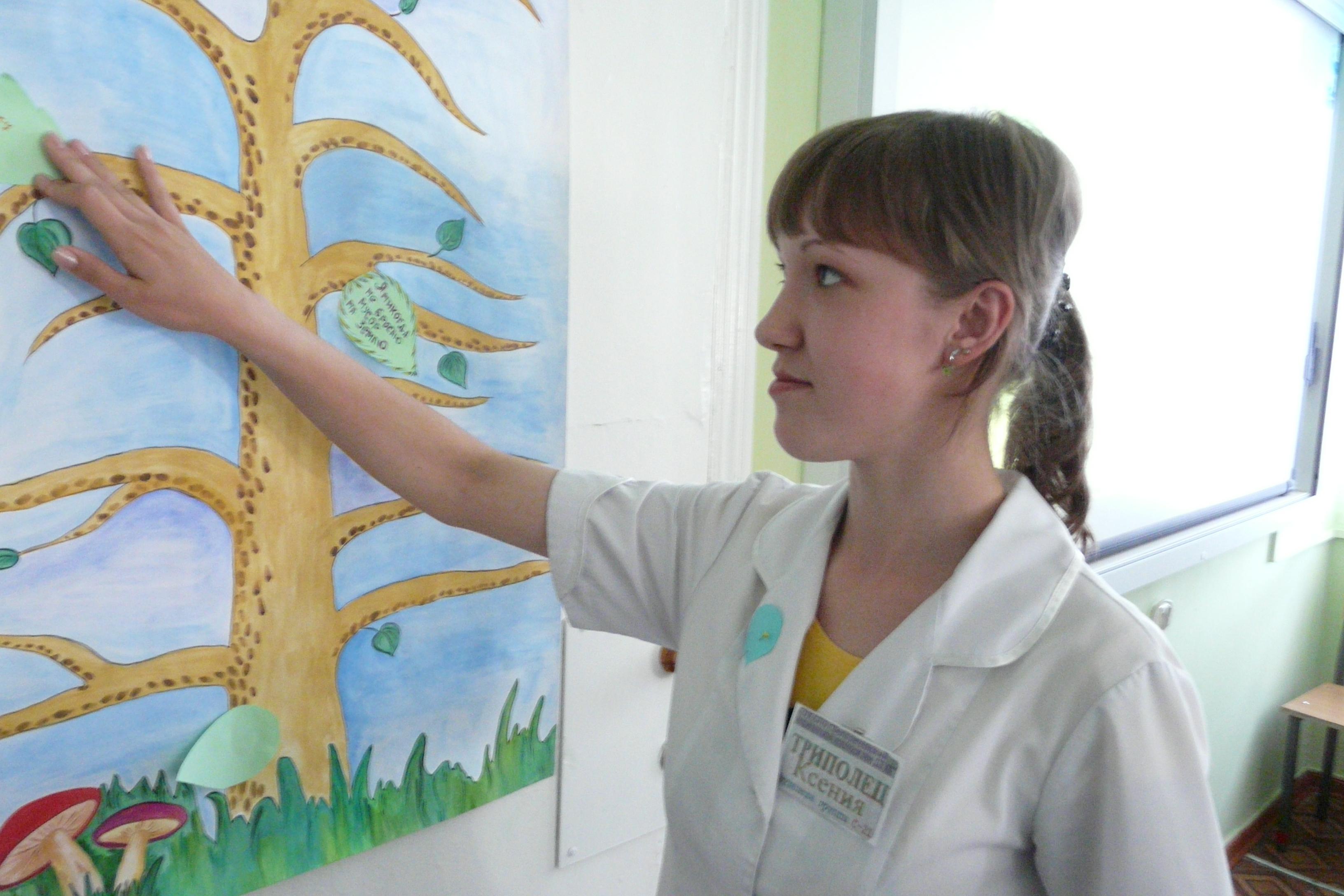 aking a mini-project “The tree of good deeds”.
aking a mini-project “The tree of good deeds”.
What can you personally do to help the environment nowadays? Tell about one thing you do to help the environment. (Students work in 2 groups. One group generates ideas that we should do and the other group that we shouldn’t do to keep our planet clean. Time is limited up to 5–7 minutes. Then pupils write their ideas on the leaves and pin them to the tree.)
( работа с плакатом)
S. 1.: Today we’re tried to find out some ways how to save our planet Earth.
We believe you’ll never pollute the environment, the place where you live.
S. 2.: Сегодня мы пытались найти пути решения экологических проблем и надеемся, что никогда не будете разрушать нашу планету – дом в котором мы живем!
S. 1.: Thank you for everybody.
S. 1.: Спасибо всем.
Песня: “We are the world, we are the children” в исполнении студентки Князевой Юлии
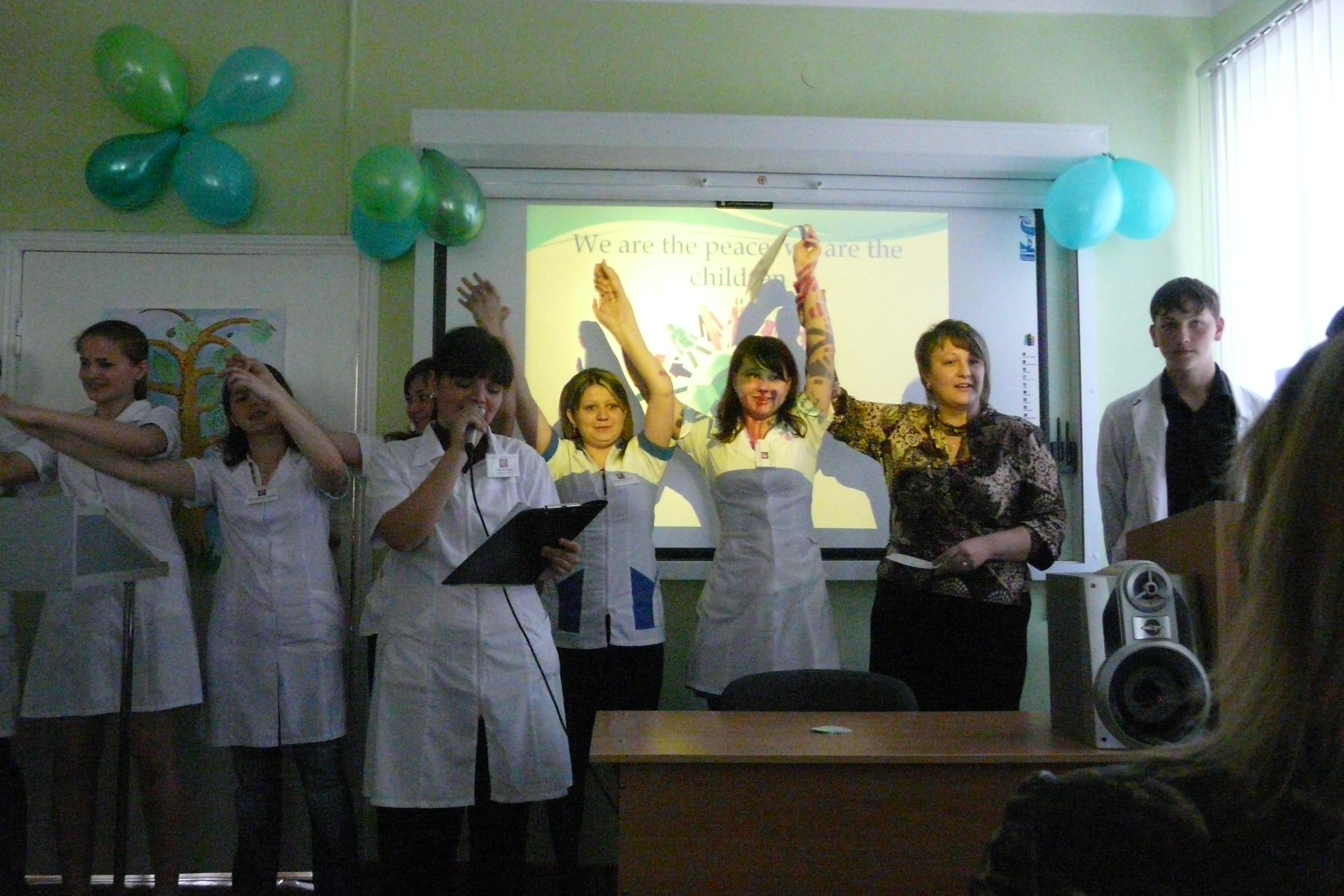
Заключительное слово преподавателя и награждение участников конференции почетными грамотами











 aking a mini-project “The tree of good deeds”.
aking a mini-project “The tree of good deeds”.










